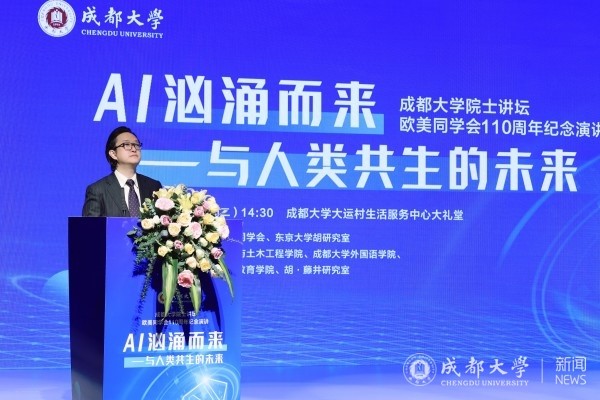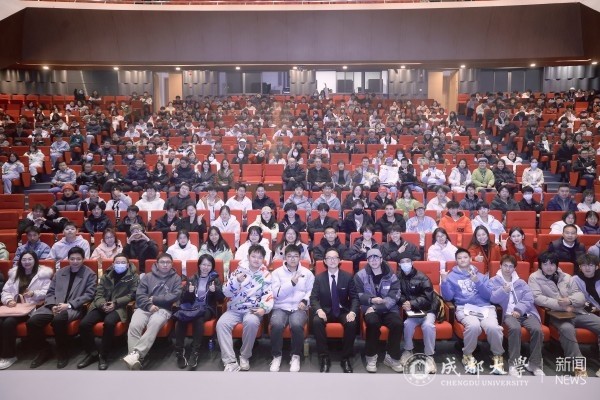
On the afternoon of January 2, Professor Hu Ang of the University of Tokyo, a foreign Aacademician of the Engineering Academy of Japan, was invited to visit Chengdu University (CDU) as a guest speaker of the Academician Forum and the 110th Anniversary Event of the Western Returned Scholars Association. He delivered an academic lecture entitled "The Rising Trend — A Future of AI and Human Coexistence". Professor Wang Qingyuan, President of CDU and the Deputy Secretary of the Party Committee, and Su Bo, Member of the Standing Committee of the Party Committee and Secretary of the Discipline Inspection Commission, attended the event and listened to the lecture. Du Jie, Director of the Office of International Cooperation and Exchange, hosted the event.
During the lecture, Academician Hu Ang provided an in-depth analysis of the development of AI, its threats to humanity, its impacts on various industries, and the symbiotic relationship between humans and AI. He pointed out that with the rapid advances in technologies, AI has been deeply integrated into our lives and become an indispensable part of modern society. The rise of technologies such as ChatGPT in 2023 has brought unprecedented impacts to various industries, enabling humans to re-examine the symbiotic relationship between them and AI in the future. Hu Ang introduced the remarkable breakthroughs of AI in areas such as language processing and image generation. However, the emergence of these technologies is not only just a sign of transformative changes but also the beginning of the infinite possibilities that AI and humans will co-create in the future. Hu Ang said that the future of architectural design and construction will increasingly rely on AI technologies, such as the use of AI-driven design and other cutting-edge technologies for the optimization of architectural design solutions and the improvement of construction efficiency. However, we also need to think about how to maintain human creativity and critical thinking in the face of impacts from AI, so as to adapt to this fast-changing era and lead the future of architectural innovation
During the Q&A session, the teachers and students were enthusiastic to share their opinions and ask questions. Academician Hu Ang patiently answered the questions and further emphasized the importance of focusing on the future of AI and human coexistence. He pointed out that in a game between humans and AI, humans' advantage lies in their ability to reason, quantify uncertainties, and intervene when faced with uncertainties. The vitality of human beings is embodied in their ability to envision future dreams and draw visionary blueprints. Humans pursue beliefs, create new things by chance, and embrace the possibilities of destiny. Sometimes, the answer to an unknown problem is found in the process of continuous trial and error, or even detours. In the face of challenges presented by AI, the best solution is to keep moving forward, rebuild confidence after being overwhelmed by technology, and continue to find a way out. Hu Ang encouraged everyone to understand and learn more about AI technology, and explore its future applications in order to discover broader possibilities.

Background Information:
Hu Ang, a foreign Aacademician of the Engineering Academy of Japan, a Fellow of St Edmund Hall, University of Oxford, and Professor of Architecture. He obtained his Ph.D. in Architecture from the University of Tokyo and taught at Sichuan University and the University of Oxford previously. Currently, he is a Distinguished Professor at the University of Tokyo, a Distinguished Academician at Chengdu University, and the Honorary Dean of the School of Architecture and Civil Engineering at Chengdu University. His research focuses on future cities and supporting technology systems, and is dedicated to developing systematic solutions for "TOD ecological smart cities". He is a mentor and important partner of Tencent's WeCity Program, the chief consultant architect of China Southwest Geotechnical Investigation & Design Institute and China Construction Underground Space, and the chief expert of the Demonstration Project for Sino-Japanese (Chengdu) Urban Construction and Open Cooperation in the Modern Service Industry.